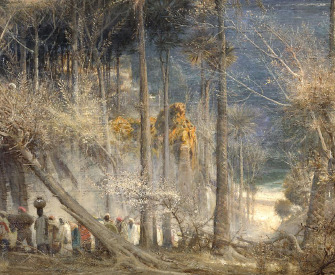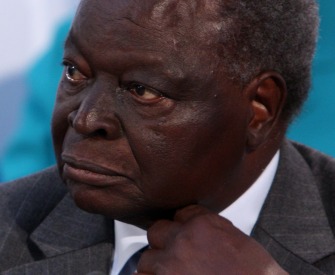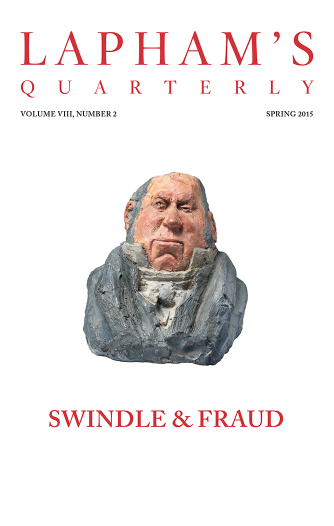Going up that river was like traveling back to the earliest beginnings of the world, when vegetation rioted on the earth and the big trees were kings. An empty stream, a great silence, an impenetrable forest. The air was warm, thick, heavy, sluggish. There was no joy in the brilliance of sunshine. The long stretches of the waterway ran on, deserted, into the gloom of overshadowed distances. On silvery sandbanks hippos and alligators sunned themselves side by side. The broadening waters flowed through a mob of wooded islands; you lost your way on that river as you would in a desert, and butted all day long against shoals, trying to find the channel till you thought yourself bewitched and cut off forever from everything you had known once—somewhere, far away, in another existence perhaps. There were moments when one’s past came back to one, as it will sometimes when you have not a moment to spare to yourself; but it came in the shape of an unrestful and noisy dream, remembered with wonder amongst the overwhelming realities of this strange world of plants and water and silence. And this stillness of life did not in the least resemble a peace. It was the stillness of an implacable force brooding over an inscrutable intention. It looked at you with a vengeful aspect. I got used to it afterwards; I did not see it anymore; I had no time. I had to keep guessing at the channel; I had to discern, mostly by inspiration, the signs of hidden banks; I watched for sunken stones; I was learning to clap my teeth smartly before my heart flew out, when I shaved by a fluke some infernal, sly old snag that would have ripped the life out of the tin-pot steamboat and drowned all the pilgrims; I had to keep a lookout for the signs of dead wood we could cut up in the night for next day’s steaming.
I sweated and shivered over that business considerably, I can tell you. After all, for a seaman to scrape the bottom of the thing that’s supposed to float all the time under his care is the unpardonable sin. No one may know of it, but you never forget the thump, eh? A blow on the very heart. You remember it, you dream of it, you wake up at night and think of it—years after—and go hot and cold all over.
Sometimes we came upon a station close by the bank, clinging to the skirts of the unknown, and the white men rushing out of a tumble-down hovel, with great gestures of joy and surprise and welcome, seemed very strange, and had the appearance of being held there captive by a spell. The word “ivory” would ring in the air for a while, and on we went again into the silence, along empty reaches, round the still bends, between the high walls of our winding way, reverberating in hollow claps the ponderous beat of the sternwheel. Trees, trees, millions of trees, massive, immense, running up high, and at their foot hugging the bank against the stream, crept the little begrimed steamboat like a sluggish beetle crawling on the floor of a lofty portico. It made you feel very small, very lost, and yet it was not altogether depressing, that feeling. After all, if you were small, the grimy beetle crawled on—which was just what you wanted it to do. Where the pilgrims imagined it crawled to I don’t know. To some place where they expected to get something, I bet! For me it crawled toward Kurtz—exclusively; but when the steam pipes started leaking we crawled very slow. The reaches opened before us and closed behind, as if the forest had stepped leisurely across the water to bar the way for our return. We penetrated deeper and deeper into the heart of darkness. It was very quiet there. At night sometimes, the roll of drums behind the curtain of trees would run up the river and remain sustained faintly, as if hovering in the air high over our heads, till the first break of day. Whether it meant war, peace, or prayer, we could not tell. The dawns were heralded by the descent of a chill stillness; the woodcutters slept, their fires burned low; the snapping of a twig would make you start. We were wanderers on a prehistoric earth, on an earth that wore the aspect of an unknown planet. We could have fancied ourselves the first of men taking possession of an accursed inheritance, to be subdued at the cost of profound anguish and of excessive toil. But suddenly, as we struggled round a bend, there would be a glimpse of rush walls, of peaked grass roofs, a burst of yells, a whirl of black limbs, a mass of hands clapping, of feet stamping, of bodies swaying, of eyes rolling, under the droop of heavy and motionless foliage. The steamer toiled along slowly on the edge of a black and incomprehensible frenzy. The prehistoric man was cursing us, praying to us, welcoming us—who could tell? We were cut off from the comprehension of our surroundings; we glided past like phantoms, wondering and secretly appalled, as sane men would be before an enthusiastic outbreak in a madhouse. We could not understand because we were too far and could not remember, because we were traveling in the night of first ages—of those ages that are gone, leaving hardly a sign and no memories.
From Heart of Darkness. Born in Ukraine with the name Józef Teodor Konrad Korzeniowski, the author as a child pointed to a map of Africa and remarked, “When I grow up I shall go there.” In 1878, he found work as a seaman on British merchant ships, learned to speak English, and in 1890 made good on his prediction when he sailed up the Congo River in command of a steamboat.
Back to Issue



